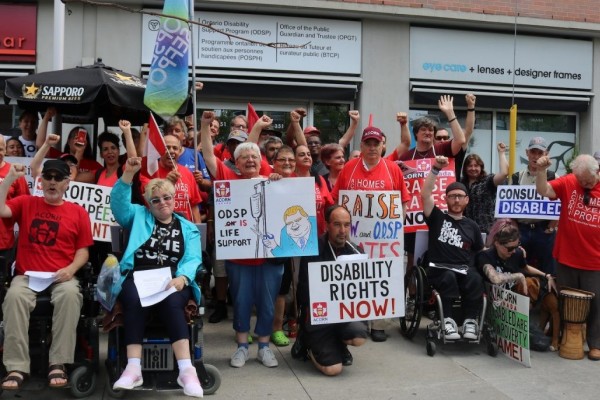Equity data as an ethical necessity: Understanding the viral confluence of injustice through COVID-19

The outbreak map dashboard showing statistics on the number of confirmed COVID-19 cases in the United States during a briefing from Johns Hopkins University on Capitol Hill on March 6, 2020 in Washington, DC. Photo by Samuel Corum.
Conversations about equity data have always been about matters of life and death.
In health statistics and epidemiological studies, equity data such as race or ethnicity are not regularly maintained. Although COVID-19 has officially claimed the lives of over 8,000 Canadians (and infected nearly 100,000) to date, the federal government has been reluctant to record equity data on the victims of the virus.
In the context of the pandemic, these conversations have engaged more of those in the mainstream, some of whom who have never had to live under the persistent threat of, or proximity to, the heightened possibility of death brought by inequality.
The conversations happening on equity data, however, do not render transparent any sort of consistency on why it is necessary, or why demands for equity continue to be a point of contention.
Equity data is a site of struggle. Its meaning is forged through a confluence of contestations about our understanding of injustice.
As researchers, professionals, and educators, we often claim to have an ethical responsibility to others. Our core aims are to improve lives and knowledge, to better understand how we act to improve life, whose lives matter, and what knowledge matters. These goals are all (re)constituted through what we do, and their products are the result of our endeavour.
Unfortunately, these contexts have rarely been constituted outside of historically established social, biological, and psychological hierarchies, systems of oppression, colonization, exploitation and hierarchical rule.
All of our knowledge is imbricated in systems and structures that have rationalized and implemented inequitable outcomes in human life, from the disciplines we study to the professions we practice.
We have and continue to wield knowledge, data, and expertise to rationalize the conditions and outcomes for violence, slavery, indentureship, colonization, exploitation, appropriation, and dehumanization. We use knowledge to establish notions of who is unworthy and undesirable.
Nevertheless, these conditions, processes, and outcomes of knowledge have always been resisted. Marginalization, oppression, and exclusion are some of the ideas we use to try to collapse and simplify these discourses for palatable consumption, often seeking to attain some sort of sympathy from those who benefit most from these systems.
These historical contexts of knowledge and data continue to permeate our lives and, when acknowledged, can help us to understand how historical inequities manifest, replicate, and impact our existence. Inequities affect health, education, housing, employment, food, water, the environment, mental health, carceral realities, migration, ownership, income, policy, law, as well as the ideas that frame how we talk about all of these.
Scholars have articulated for decades the need to focus on the unique systemic, structural and individual operations of all forms of racism. Many tend to the specificities of racism without obscuring the need to also attend to gender and sexuality, as well as ability, age, class and other aspects of life that have been crafted as labels signifying “the other.” These analyses are robust and nuanced. Engaging with the complexities of the lived realities of our human condition are necessary to understand the lived realities themselves.
Erasing these complexities or leaving them in obscurity frustrates “equity” work. Simultaneously, wielding ideas about race, ability, sexuality, gender, and class for justice also frustrates equity work within existing systems as they re-articulate ideas of difference, sculpted by the view that such differences make efforts to recognize them as burdensome, threatening or deficient.
When equity data is demanded by those working for justice, it is demanded reluctantly, knowing it participates in the remaking of “othering” labels, while potentially surfacing the lived realities of these labels—as they are materially experienced—as harm. This occurs while equity-seeking groups are consistently asked to oversimplify these discussions for palatable consumption.
Demands for equity data are always at risk of being reduced to statistics connected to ideas about impartiality or objectivity about race, which undermine our appreciations of race, racism and racialization as socially, historically, and politically constituted. There is also the risk of limiting the understanding of lived experience as mere points of data, perpetuating the risks of being used for quotas or tokenism or to advance racist scientific ideas that falsely equate race with genetic variation.
When we talk about how inequities impact our lives and resist our intervention, it is not difficult during the time of COVID-19 to drift quickly into thinking about viral discourse. The viral aspects of inequity persist with a similar gait and might benefit from an integration of knowledge that appreciates complexities and the risks to life associated with prevailing inequity. Viral discourses pertain not only to the biological or natural, but also to the viral discourse of social media where misinformation is propagated and based on erasure, omission, and narratives used to rationalize the injustice of victims.
The oversimplification of knowledge about equity data can result in a vulnerability to misinformation. The omission of complex knowledge can also allow for problems to be ignored or intervened upon ineffectively.
The realities of COVID-19 are right in front of us, amplifying inequities in policing, resource distribution, and beyond as matters of life and death. Recent examples of anti-Black, anti-Asian, anti-Indigenous, anti-Muslim, anti-South Asian racism, framed within equity groups, signal to us that these acts are embedded in histories of inequity. When stressed, established inequities will exacerbate projects of dehumanization and make remedies more difficult.
We can do equity data differently, with a more direct route towards justice. It begins with respect to those voices experiencing pronounced suffering and death. It requires a respect for the confluence of histories that have culminated in our contemporary. It requires respect for an appreciation of the complexities, contexts and conditions of equity data that have been ignored and rendered unworkable, allowing racism to perpetuate. Equity data cannot and should not be collected on equity-seeking groups without being given the power and resources to implement necessary interventions to effect change.
Data is not immune to injustice. In fact, it can be used to perpetuate injustice. The demands for equity data collection and analysis aim not to reproduce the taxonomies and hierarchies of oppression, but to forever undermine them. Our ethical obligation to life is a refusal to omit the inequitable conditions that expand the chasm of expected longevity.
This article was first written on May 8, 2020.
Ameil Joseph is an Associate Professor in the School of Social Work at McMaster University.










